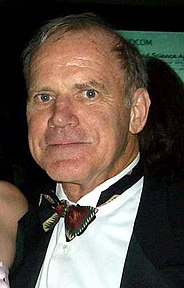
Edward Osborne Wilson, usually cited as E. O. Wilson, is an American biologist, naturalist, and writer. Wilson is an influential biologist who on numerous occasions has been given the nicknames "The New Darwin", "Darwin's natural heir" or "The Darwin of the 21st century". His biological specialty is myrmecology, the study of ants, on which he has been called the world's leading expert.

Kary Banks Mullis was an American biochemist. In recognition of his invention of the polymerase chain reaction (PCR) technique, he shared the 1993 Nobel Prize in Chemistry with Michael Smith and was awarded the Japan Prize in the same year. His invention became a central technique in biochemistry and molecular biology, described by The New York Times as "highly original and significant, virtually dividing biology into the two epochs of before PCR and after PCR."

Science is a systematic enterprise that builds and organizes knowledge in the form of testable explanations and predictions about the universe.

Scientific American is an American popular science magazine. Many famous scientists, including Albert Einstein, have contributed articles to it. In print since 1845, it is the oldest continuously published monthly magazine in the United States.

Nature is a British weekly scientific journal founded and based in London, England. As a multidisciplinary publication, Nature features peer-reviewed research from a variety of academic disciplines, mainly in science and technology. It has core editorial offices across the United States, continental Europe, and Asia under the international scientific publishing company Springer Nature. Nature was one of the world's most cited scientific journals by the Science Edition of the 2019 Journal Citation Reports, making it one of the world's most-read and most prestigious academic journals. As of 2012, it claimed an online readership of about three million unique readers per month.

Alfred Rupert Sheldrake is an English author, and researcher in the field of parapsychology, who proposed the concept of morphic resonance, a conjecture which lacks mainstream acceptance and has been characterised as pseudoscience. He worked as a biochemist at Cambridge University from 1967 to 1973 and as principal plant physiologist at the International Crops Research Institute for the Semi-Arid Tropics in India until 1978.
Skeptical Inquirer is a bimonthly American general-audience magazine published by the Committee for Skeptical Inquiry (CSI) with the subtitle: The Magazine for Science and Reason. In 2016 it celebrated its fortieth anniversary. For most of its existence, the Skeptical Inquirer (SI) was published by the Committee for the Scientific Investigation of Claims of the Paranormal, widely known by its acronym CSICOP. In 2006 the CSICOP Executive Council shortened CSICOP's name to the Committee for Skeptical Inquiry (CSI) and broadened its mission statement.

Science, also widely referred to as Science Magazine, is the peer-reviewed academic journal of the American Association for the Advancement of Science (AAAS) and one of the world's top academic journals. It was first published in 1880, is currently circulated weekly and has a subscriber base of around 130,000. Because institutional subscriptions and online access serve a larger audience, its estimated readership is 570,400 people.

The American Chemical Society (ACS) is a scientific society based in the United States that supports scientific inquiry in the field of chemistry. Founded in 1876 at New York University, the ACS currently has more than 155,000 members at all degree levels and in all fields of chemistry, chemical engineering, and related fields. It is one of the world's largest scientific societies by membership. The ACS is a 501(c)(3) non-profit organization and holds a congressional charter under Title 36 of the United States Code. Its headquarters are located in Washington, D.C., and it has a large concentration of staff in Columbus, Ohio.

Popular Science is an American quarterly magazine carrying popular science content, which refers to articles for the general reader on science and technology subjects. Popular Science has won over 58 awards, including the American Society of Magazine Editors awards for its journalistic excellence in 2003, 2004, and 2019. With roots beginning in 1872, Popular Science has been translated into over 30 languages and is distributed to at least 45 countries.
Nature Portfolio is a division of the international scientific publishing company Springer Nature that publishes academic journals, magazines, online databases, and services in science and medicine. Nature Research's flagship publication is Nature, a weekly multidisciplinary journal first published in 1869. It also publishes the Nature-titled research journals, Nature Reviews journals, society-owned academic journals, and a range of open access journals, including Scientific Reports and Nature Communications. Springer Nature also publishes Scientific American in 16 languages, a magazine intended for the general public. In 2013, prior to the merger with Springer and the creation of Springer Nature, Nature Publishing Group's owner, Holtzbrinck Publishing Group, bought a controlling stake in Frontiers.

Demis Hassabis is a British artificial intelligence researcher, neuroscientist, video game designer, entrepreneur, and five times winner of the Pentamind board games championship. He is the chief executive officer and co-founder of DeepMind, and a UK Government AI Advisor since 2018.

The New York Academy of Sciences was founded in January 1817. It is one of the oldest scientific societies in the United States. An independent, nonprofit organization with more than 20,000 members in 100 countries, the academy's mission is "to advance scientific research and knowledge; to support scientific literacy; and to promote the resolution of society's global challenges through science-based solutions". The incoming president and CEO is Nicholas Dirks; the current chair of the board of governors of the academy is NYU professor and longtime senior vice president of all research for IBM, Paul Horn. He succeeds Nancy Zimpher, Chancellor, The State University of New York (SUNY).

Christopher Cole Mooney is an American journalist and author of four books including The Republican War on Science (2005). Mooney's writing focuses on subjects such as climate change denialism and creationism in public schools, and he has been described as "one of the few journalists in the country who specialize in the now dangerous intersection of science and politics." In 2020 he was awarded a Pulitzer Prize for a series of articles on global warming published in The Washington Post.
Daniel Lawrence Schacter is an American psychologist. He is a Professor of Psychology at Harvard University. His research has focused on psychological and biological aspects of human memory and amnesia, with a particular emphasis on the distinction between conscious and nonconscious forms of memory and, more recently, on brain mechanisms of memory and brain distortion, and memory and future simulation.

Nature Communications is a peer-reviewed, open access, scientific journal published by Nature Research since 2010. It is a multidisciplinary journal and it covers the natural sciences, including physics, chemistry, earth sciences, medicine, and biology. The founding editor-in-chief was Lesley Anson, followed by Joerg Heber, Magdalena Skipper, and Elisa De Ranieri. The journal has editorial offices in London, Berlin, New York City, and Shanghai.
Adam Frank is an American physicist, astronomer, and writer. His scientific research has focused on computational astrophysics with an emphasis on star formation and late stages of stellar evolution. His work includes studies of exoplanet atmospheres and astrobiology. The latter include studies of the generic response of planets to the evolution of energy-intensive civilizations (exo-civilizations).

Ken Liu is a multiple Hugo Award-winning American author of science fiction and fantasy. His epic fantasy series The Dandelion Dynasty, the first work in the "silkpunk" genre, is published by Simon & Schuster. His short stories have appeared in F&SF, Asimov's, Analog, Lightspeed, Clarkesworld, and multiple "Year's Best" anthologies.
Frontiers Media SA is a publisher of peer-reviewed open access scientific journals currently active in science, technology, and medicine. It was founded in 2007 by a group of neuroscientists, including Henry and Kamila Markram, and later expanded to other academic fields. Frontiers is based in Lausanne, Switzerland, with other offices in London, Madrid, Seattle and Brussels. All Frontiers journals are published under a Creative Commons Attribution License (CC-BY).

The San Francisco Declaration on Research Assessment (DORA) intends to halt the practice of correlating the journal impact factor to the merits of a specific scientist's contributions. Also according to this statement, this practice creates biases and inaccuracies when appraising scientific research. It also states that the impact factor is not to be used as a substitute "measure of the quality of individual research articles, or in hiring, promotion, or funding decisions".















